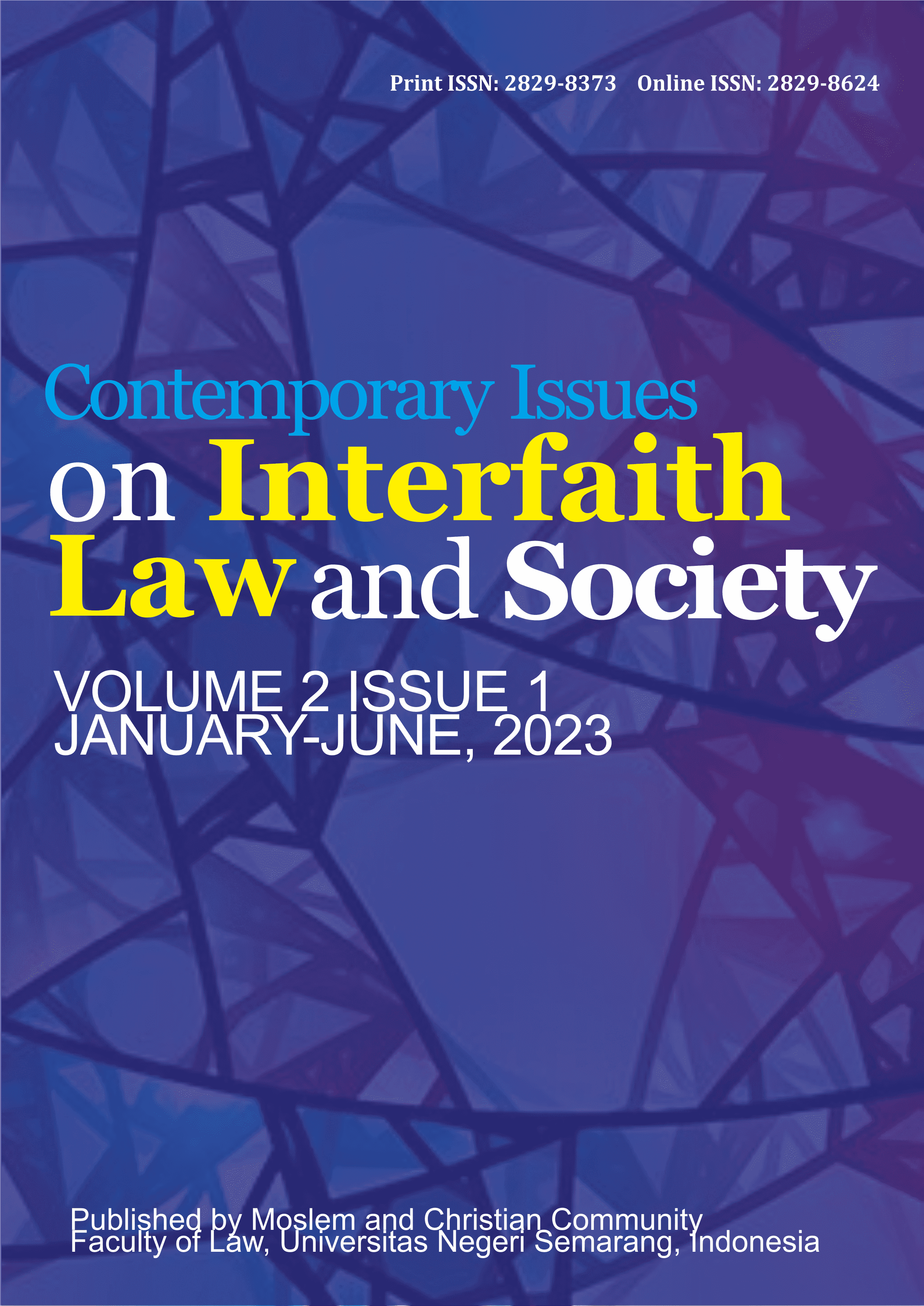A Discourse of Capital Punishment in the Islamic Law and Human Rights Law
Main Article Content
Abstract
Capital punishment remains a contentious issue at the intersection of Islamic law and human rights law. This paper undertakes a comprehensive examination of the discourse surrounding capital punishment within these two legal frameworks. Islamic law, rooted in the Quran and Sunnah, provides guidance on criminal justice, including provisions for the death penalty in certain cases. Human rights law, on the other hand, emphasizes the protection of individuals' inherent dignity and right to life, often challenging the legitimacy of capital punishment. Through a comparative analysis, this paper explores the philosophical, theological, and legal underpinnings of capital punishment in Islamic law and human rights law. It delves into the historical evolution of capital punishment in Islamic jurisprudence and examines contemporary interpretations and applications of hudud punishments. Additionally, it scrutinizes international human rights instruments and jurisprudence, evaluating the compatibility of capital punishment with principles of human dignity and the right to life. Furthermore, this paper examines the practical implications of capital punishment within Islamic legal systems and its interaction with human rights norms. It considers case studies and legal precedents from various jurisdictions to illustrate the complexities and challenges inherent in reconciling Islamic legal principles with international human rights standards regarding capital punishment. By engaging in this discourse, the paper aims to foster a nuanced understanding of the tensions and harmonies between Islamic law and human rights law concerning capital punishment. It contributes to scholarly dialogue on the intersection of religion, law, and human rights.
Article Details

This work is licensed under a Creative Commons Attribution-ShareAlike 4.0 International License.
References
Anisah, Siti. "Penerapan Hukum Qishash untuk Menegakkan Keadilan." Journal of Islamic Law Studies 1, No. 2 (2018): 98-109.
Anjari, Warih. "Penjatuhan Pidana Mati di Indonesia dalam Perspektif Hak Asasi Manusia." Jurnal Widya Yustisia 1, No. 2 (2015): 247155.
Arief, Amelia. “Problematika Penjatuhan Hukuman Pidana Mati dalam Perspektif Hak Asasi Manusia dan Hukum Pidana,” Kosmik Hukum 19, No. 1 (2019). DOI: 10.30595/kosmikhukum.v19i1.4086.
Besar, "HAM, Hukuman Mati, dan Pandangan Bismar Siregar" https://business-law.binus.ac.id/2015/01/28/ham-hukum-mati-dan-pandangan-bismar-siregar/ accessed at 25 November 2021.
Chasanah, Chusnul. "Masih Perlukah Hukuman Mati?" https://pshk.or.id/blog-id/masih-perlukah-hukuman-mati/ accessed on 25 November 2021.
Eddyono, Supriyadi W., and Erasmus A.T. Napitupuhi. Hukuman Mati dalam R KUHP: Jalan Tengah yang Meragukan. (Jakarta: Institute for Criminal Justice Reform, Jakarta, 2015).
Fajrin, Yaris Adhial, et al. "Death Penalty for Corruptors in Indonesian Human Rights Perspective." Unnes Law Journal: Jurnal Hukum Universitas Negeri Semarang 6, No. 2 (2020): 287-404.
Hasanal, Mulkan. “Hukuman Mati, Hukum Islam, Hukum Pidana Indonesia,” Doctrinal 4, No. 1 (2019).
Kusuma, Mahendra, and Rosida Diani. "Qishash Diyat dalam Hukum Pidana Islam Lebih Mencerminkan Keadilan dari Sisi Korban." Jurnal Dinamika 2, No. 2 (2022): 45-54.
Kurniawan, Syigit Dony. "The Capital Punishment for Narcotic Crime: Pros and Cons in Indonesian Legal System." The Indonesian Journal of International Clinical Legal Education 2, No. 4 (2020): 393-406.
Lestari, Dewi Indah. "The Imposition of the Death Penalty for Drug Dealers in the Perspective of Human Rights." Semarang State University Undergraduate Law and Society Review 1, No. 1 (2021): 35-50.
Lon, Yohanes S. "Penerapan Hukuman Mati di Indonesia dan Implikasi Pedagogisnya." KERTHA WICAKSANA 14, No. 1 (2020): 47-55.
Pratama, Widhy Andrian. "Penegakan Hukuman Mati terhadap Pembunuhan Berencana." SIGn Jurnal Hukum 1, No. 1 (2019): 29-41.
Rahman, Abdul. Tinda Pidana dalam Syariat Islam. (Jakarta: Rineka Cipta, Jakarta, 1992).
Rajafi, Ahmad. "Qishash dan Maqashid Al-Syariah (Analisis Pemikiran asy-Syathibi dalam Kitab Al-Muwafaqat)." Jurnal Ilmiah Al-Syir'ah 8, No. 2 (2010).
Ranjani, I Gusti Agung Ayu Niti and Made Maharta Yasa, “Menyoal Penerapan Hukuman Rajam dan Mati Bagi Kaum Lesbian, Gay, dan Transgender di Brunei Darussalam,” Kertha Negara: Journal Ilmu Hukum 8, No. 3 (2020): 1–15.
Rohman, Anas. "Qishash Law and Human Rights." TAWASUT 7.02 (2020); Rahman, M. Taufiq. "Relevansi Hukum Qishash dengan Hak Asasi Manusia." Risalah 33, No. 2 (1995): 69-70.
Saputra, Adi, and Febrian Jadug Santoso. "Death Penalty, Right to Life, and Various Controversies in Human Rights." Unnes Law Journal: Jurnal Hukum Universitas Negeri Semarang 5, No. 1 (2019): 1-8.
Susanto, Mei, and Ajie Ramdan. "Kebijakan Moderasi Pidana Mati." Jurnal Yudisial 10, No. 2 (2017): 193-215.
Tiara, Ayu Eza. Pengaturan Hukuman Mati Dibeberapa Negara (Studi Kasus di Negara Islam dan Non-Islam). Thesis. (Jakarta: UIN Syarif Hidayatullah Jakarta, Fakultas Syariah dan Hukum, 2016).
Utomo, Bernadetta Lakshita Pradipta. "Pidana Mati Terhadap Koruptor di Indonesia dalam Undang-Undang No 31 Tahun 1999 tentang Tindak Pidana Korupsi." Ikatan Penulis Mahasiswa Hukum Indonesia Law Journal 1, No. 1 (2021): 12-20.
Wahyudi, Slamet Tri. "Problematika Penerapan Pidana Mati dalam Konteks Penegakan Hukum di Indonesia." Jurnal Hukum dan Peradilan 1, No. 2 (2012): 207-234.
Wahyuni, Ribut Tirto. "Capital Punishment and (in) Justice." Semarang State University Undergraduate Law and Society Review 1, No. 2 (2021): 141-160.
Wahyudi, Slamet Tri. “Problematika Penerapan Pidana Mati dalam Konteks Penegakan Hukum di Indonesia,” Jurnal Hukum dan Peradilan 1, No. 2 (2012): 207, DOI: 10.25216/jhp.1.2.2012.207-234.
Wicaksono, Setiawan. "Hambatan dalam Menerapkan Pasal 6 Kovenan Internasional Tentang Hak-Hak Sipil dan Politik sebagai Dasar Penghapusan Pidana Mati di Indonesia." Pandecta Research Law Journal 11, No. 1 (2016): 65-79.
Yasin, Yasin. "Kontekstualisasi Teologi Keadilan dalam Hukum Qishash." Jurnal Ilmiah Al-Syir'ah 7, No. 1 (2016).
Zulfa, Eva Achjani. "Menakar Kembali Keberadaan Pidana Mati (Suatu Pergeseran Paradigma Pemidanaan di Indonesia)." Lex Jurnalica 4, No. 2 (2007): 17976.
